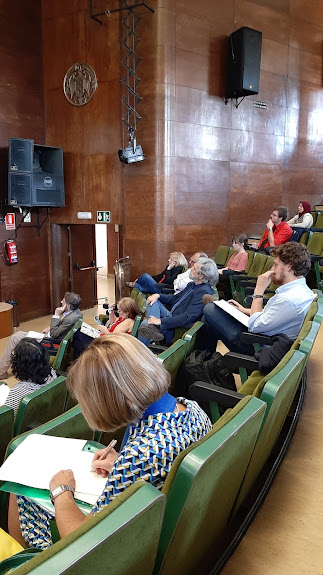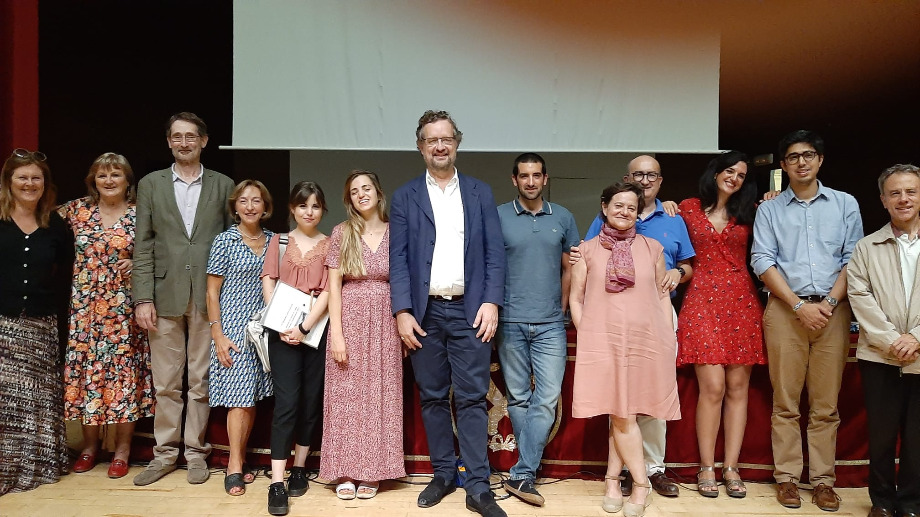 Dostoyevsky's "The Idiot": "Beauty will save the world".
Dostoyevsky's "The Idiot": "Beauty will save the world". "The bride and groom", by Alessandro Manzoni.
"The bride and groom", by Alessandro Manzoni. José María TorralbaA Christianity with a bourgeois mentality is problematic".
José María TorralbaA Christianity with a bourgeois mentality is problematic".After six congresses on the presence of God in contemporary literature where 97 researchers from 40 universities in 13 countries (Australia, Belarus, Brazil, Cameroon, France, Germany, Italy, Mexico, Slovakia, Spain, United States, United States, Mexico, Venezuela, Russia) participated, presenting 166 papers and communications on 134 authors in 16 different languages, a series of conclusions can be drawn.
God is very present in contemporary literature in a very diverse way, as befits a literature of the last centuries, in which the hybridization of genres and modes of writing are almost infinite. The attitudes that flourish are as many as the human possibilities of relationship with God: love, search, doubt, rejection, and so on.
To focus on the last congress, held on September 22 and 23 at the Faculty of Philology of the Complutense University of Madrid, we can list a series of contributions.

The list of writers who are converts or converts who write their testimony of conversion is very large. For the Anglo-Saxon world, it is enough to know the work of Joseph Pierce to prove it.
Lyrical poetry is a privileged space to find the footprint of God, because poets usually bare their souls. It is difficult to find a poet who, in one way or another, does not leave a record of his attitude towards God. In the VI Congress we have observed it in the Venezuelan poet Armando Rojas Guardia or the Spanish poet Luis Alberto de Cuenca.
The Christian tradition has led to a relationship with God, a consequence of the incarnation of the Word that is still evident among non-believing or agnostic writers. In this sense, it is significant the figure of Concha Zardoya, Spanish poet (1914-2004), who can be described as a "mystical agnostic", because she expresses her search for God with a highly effective mystical language learned in the authors of the Spanish Golden Age.
In other cases, spirituality and religious sensitivity permeate the entire poetic production, as is the case with Chilean Nobel Prize winner Gabriela Mistral. Anne Carson, María Victoria Atencia, Juan Ramón Jiménez, Gerardo Diego and Dulce María Loynaz have also participated in the congress, which usually organizes recitals in the voice of their authors. The Madrid poet Izara Batres was in charge of giving voice to her verses.
The connection of lyric poetry with the divine gives rise to anthologies on religious poetry or poetry alluding to the divine. The sixth congress has offered a study on Hispanic anthologies of this tenor from the 40s of the last century until now.
The study of Christians or non-Christians from other traditions in the face of the figure of God is interesting. Paradoxical is the case of the Japanese convert Shusaku Endo in his novel "The God of God".Silence"or the also Japanese Yukio Mishima.
Memoirs, diaries (writings of the self) or letters are particularly interesting spaces for manifesting attitudes before God. We have seen this in the letters between the American Catholic writers Caroline Gordon and Flannery O'Connor.
The world of science fiction, utopias and dystopias is a fertile ground for projecting desires on the great human themes: God, the world and man himself. We heard a presentation on the transcendent in Ted Chiang's short stories and another on soulless humanitarianism and godless religion in the first dystopian work: "The World, God and Man himself.Lord of the world" by Robert H. Benson.
Possibly feminine writing reveals more clearly the recesses of the soul. This has been seen in the storyteller Ana María Matute and her question of meaning in her work "The meaning of the soul".Small theater".
The congresses also serve to make lesser-known authors known. Such was the case, in this sixth edition, of the Slovak poet Janko Silan, a Catholic priest, and the Spanish bishop Gilberto Gómez González.
The variety of perspectives is great: from the German avant-gardist Hugo Ball to the original and profound French novelist Christian Bobin to the 20th century Egyptian physician Kamil Huseyn. Authors from different religious traditions converge in their interest in God or the religious.
Contemporary secularization is also reflected in literature. An example of this has been "The Saga/Fugue" by J.B. by Gonzalo Torrente Ballester.
For the past three years, the "Authors in Search of Authors" congresses have been dedicating a series of papers to the figures of Cardinal Newman and Edith Stein, both Catholic saints and icons of the dialogue between religion and modernity. Two very interesting papers on Newman were presented at the VI Congress. One of them established some connections between the Cardinal and the work of Tolkien, and the other one presented a gloss on the Newman novel "Lose or win", which fictionalizes his conversion to Catholicism.
The University of Salamanca will publish in the coming months a monograph with the highlights of this VI Congress.











